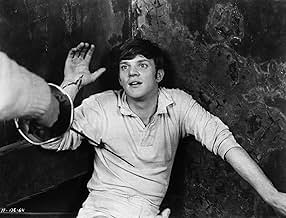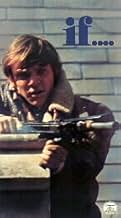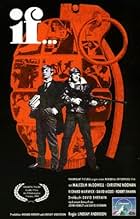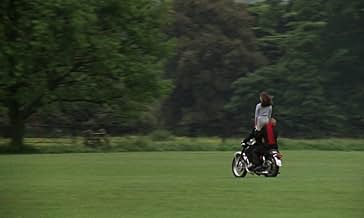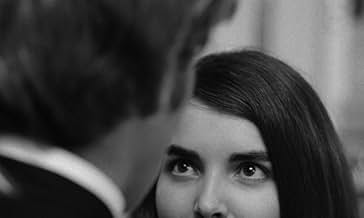VALUTAZIONE IMDb
7,4/10
26.007
LA TUA VALUTAZIONE
In una tradizionale scuola privata in Inghilterra, l'alunno vittima di bullismo, Mick Travis, e i suoi amici decidono di ribellarsi dopo una serie di maltrattamenti e indignazioni.In una tradizionale scuola privata in Inghilterra, l'alunno vittima di bullismo, Mick Travis, e i suoi amici decidono di ribellarsi dopo una serie di maltrattamenti e indignazioni.In una tradizionale scuola privata in Inghilterra, l'alunno vittima di bullismo, Mick Travis, e i suoi amici decidono di ribellarsi dopo una serie di maltrattamenti e indignazioni.
- Regia
- Sceneggiatura
- Star
- Nominato ai 2 BAFTA Award
- 2 vittorie e 4 candidature totali
Mary MacLeod
- Mrs. Kemp - Staff
- (as Mary Macleod)
Recensioni in evidenza
Lindsay Anderson's 1968 film If... is a beautiful film with a simple message, yet the director's touch and the performances take it to entirely different level.
If... takes place in all boys boarding school and stars Malcolm McDowell as
"Mick" (McDowell in his first screen role). Mick and his two friends feel
somewhat distant from their peers, school, and society. Their general attitude towards such things as sex, war, and authority could be call revolutionary. With surrealistic touches such as unexplained occurrences and changing between
color and black and white. Lindsay Anderson paints a vivid picture of "teenage alienation" before there was a term for such a thing. McDowell would later reprise his role of "Mick" in two other Anderson pictures O' Lucky Man and Britannia Hospital. A must see for fans of McDowell. Just a great film with a message that sparks positive, pro-active thinking. An important film that makes you remember to question authority instead complying to it rules. Sadly If... is not available on DVD at this time.
If... takes place in all boys boarding school and stars Malcolm McDowell as
"Mick" (McDowell in his first screen role). Mick and his two friends feel
somewhat distant from their peers, school, and society. Their general attitude towards such things as sex, war, and authority could be call revolutionary. With surrealistic touches such as unexplained occurrences and changing between
color and black and white. Lindsay Anderson paints a vivid picture of "teenage alienation" before there was a term for such a thing. McDowell would later reprise his role of "Mick" in two other Anderson pictures O' Lucky Man and Britannia Hospital. A must see for fans of McDowell. Just a great film with a message that sparks positive, pro-active thinking. An important film that makes you remember to question authority instead complying to it rules. Sadly If... is not available on DVD at this time.
This glorious 1968 film is a document not just of its times but of the eternal and mysterious communion between two enormous artists. Lindsay Anderson, the director, the mentor, the older man and Malcolm McDowell his young, brilliant, loving disciple. The trust between this two men is overwhelming and the results are in every frame in every nuance. For me, to see this film after many years was a remarkable emotional experience. Daring, visionary with a Malcolm McDowell that broke new ground with the fearlessness of an explorer venturing into totally virgin territory. Brilliant, beautiful, unique. Lead by the magical hand of Anderson and McDowell we confront the anger of the artists with their love for each other. Wow!
More so than with any other film I've watched in recent memory, I rather don't entirely know what to say after watching this. There's a stark, jolting precision and brutality to much of the movie, even well preceding the abject violence, yet also a weirdly poetic beauty at many points. This is as true for Lindsay Anderson's direction as it is for David Sherwin's screenplay, in all ways, but also for the acting. Performances are exact and practiced, but also fluid and natural. Whether presented in pure black and white, or in color under drab skies or sunny blue, the very image before us and cinematography is rich and lush. For viewers such as myself whose perspective on schooling in the United Kingdom is informed wholly by cinematic exhibition and not personal experience, the strict regimentation and forced social arrangements are both fascinating and uninviting - to say nothing of what embellishments the movie makes in imparting its tale. When all is said and done, the result is that for any similarities one could find to this, that, or the other thing in more than 50 years since, 'If....' still feels quite unlike anything else.
For all the pomp and circumstance and plays for power and social position, and the inherent fictional nature of the feature, there's an earnestness to every aspect - characters, dialogue, scene writing, narrative, direction, performances - that comes off as very real, organic and relatable. It's an enticing balance maintained at all times between various moods and tones, with the interactions between characters taking foremost precedence as a focal point and anchor, whether trending toward antagonism or camaraderie. And with that said, not to belabor the point, but the contributions of the actors seems particularly essential in 'If....' to cementing the picture. As I've suggested, I think everyone on hand does a fine job of helping to bring the story to life with portrayals of nuance, poise, and personality, yet this goes above all for those whose characters are ultimately dubbed the "crusaders." While credited alongside those more prominent, Rupert Webster and Christine Noonan have little more than bit parts as Philips and "the girl"; we know so little about their characters, and one wishes they could have been fleshed out more at least to solidify motivations. Still, Webster and Noonan make strong impressions despite their limited time on screen. David Wood and Richard Warwick are decidedly more visible as Knightly and Wallace, and both actors do well in embodying the sneering disregard of the boys. But of course it's unmistakable Malcolm McDowell, starring as protagonist Mick Travis, who stands out most of all. There are subtleties in McDowell's distinct vocal timbre, and in his expressions and body language, that communicate definite confidence, defiance, and attitude, and just as it's hard to imagine anyone else as Alex DeLarge in 'A clockwork orange,' he is a perfect fit to depict the boiling malcontent of young Travis.
I don't feel that it's perfect. As well made as it is, and as enjoyable as the viewing experience is, there's a part of me that think maybe my perception of shortcomings is actually just an inability to glean the artistic choice behind certain inclusions. Again speaking to the characters of Philips and the girl - we're given minimal information of them generally, and little or nothing that would meaningfully serve to explain their participation in the finale. Jute is given a fair amount of screen time early on, then wordlessly fades from the narrative. One could infer to a reasonable certainty the significance of a specific scene featuring Mrs. Kemp, but in the end it just seems superfluous to the whole. Broadly speaking, it just seems like the writing could have stood to be a little tighter and more concrete; by no means does this completely dampen the value, but it's a notable aspect of the production.
Subjective faults notwithstanding, however - by and large, 'If....' is pretty fantastic. I'm not sure that it totally met my expectations based on what little I had read of it, but for the most part, I'm glad to have been surprised. It's a wonderfully subversive story of individuality and discontent set against the rigidity and corruption of the establishment, and it's presented with a refined touch behind almost every element. Even if something about the feature feels a little off, and not fully copacetic, that sense is minor in comparison to the engrossing drama to play out. Minding content warnings for violence and nudity, this isn't going to be for everyone, but I think it's solid enough that I'd have no qualms about recommending it to just about anyone. Though perhaps not altogether essential, 'If....' is an excellent, satisfying picture that's worth checking out if one has the opportunity.
For all the pomp and circumstance and plays for power and social position, and the inherent fictional nature of the feature, there's an earnestness to every aspect - characters, dialogue, scene writing, narrative, direction, performances - that comes off as very real, organic and relatable. It's an enticing balance maintained at all times between various moods and tones, with the interactions between characters taking foremost precedence as a focal point and anchor, whether trending toward antagonism or camaraderie. And with that said, not to belabor the point, but the contributions of the actors seems particularly essential in 'If....' to cementing the picture. As I've suggested, I think everyone on hand does a fine job of helping to bring the story to life with portrayals of nuance, poise, and personality, yet this goes above all for those whose characters are ultimately dubbed the "crusaders." While credited alongside those more prominent, Rupert Webster and Christine Noonan have little more than bit parts as Philips and "the girl"; we know so little about their characters, and one wishes they could have been fleshed out more at least to solidify motivations. Still, Webster and Noonan make strong impressions despite their limited time on screen. David Wood and Richard Warwick are decidedly more visible as Knightly and Wallace, and both actors do well in embodying the sneering disregard of the boys. But of course it's unmistakable Malcolm McDowell, starring as protagonist Mick Travis, who stands out most of all. There are subtleties in McDowell's distinct vocal timbre, and in his expressions and body language, that communicate definite confidence, defiance, and attitude, and just as it's hard to imagine anyone else as Alex DeLarge in 'A clockwork orange,' he is a perfect fit to depict the boiling malcontent of young Travis.
I don't feel that it's perfect. As well made as it is, and as enjoyable as the viewing experience is, there's a part of me that think maybe my perception of shortcomings is actually just an inability to glean the artistic choice behind certain inclusions. Again speaking to the characters of Philips and the girl - we're given minimal information of them generally, and little or nothing that would meaningfully serve to explain their participation in the finale. Jute is given a fair amount of screen time early on, then wordlessly fades from the narrative. One could infer to a reasonable certainty the significance of a specific scene featuring Mrs. Kemp, but in the end it just seems superfluous to the whole. Broadly speaking, it just seems like the writing could have stood to be a little tighter and more concrete; by no means does this completely dampen the value, but it's a notable aspect of the production.
Subjective faults notwithstanding, however - by and large, 'If....' is pretty fantastic. I'm not sure that it totally met my expectations based on what little I had read of it, but for the most part, I'm glad to have been surprised. It's a wonderfully subversive story of individuality and discontent set against the rigidity and corruption of the establishment, and it's presented with a refined touch behind almost every element. Even if something about the feature feels a little off, and not fully copacetic, that sense is minor in comparison to the engrossing drama to play out. Minding content warnings for violence and nudity, this isn't going to be for everyone, but I think it's solid enough that I'd have no qualms about recommending it to just about anyone. Though perhaps not altogether essential, 'If....' is an excellent, satisfying picture that's worth checking out if one has the opportunity.
Made in 1968, this film still made me shiver even though I started at public school in 1977. Things had changed somewhat by then, but not beyond recognition, and for sure I felt powerful echoes in this movie. By the time I left, the country was steeped in Thatcherism, and the style of self advancement that came with it was replacing the old guard watchers of 'If....' would recognise. The housemaster and headboy were 2 characters I can especially recall, but there are flashes of others in many of the characters.
When you see this film, see it as a historical satire, with first the historical atmosphere of a public school being accurately recreated, then second the satire taking form just in time to administer the purgative judgement of the surreal denouement.
There. Spoken like a public schoolboy.
When you see this film, see it as a historical satire, with first the historical atmosphere of a public school being accurately recreated, then second the satire taking form just in time to administer the purgative judgement of the surreal denouement.
There. Spoken like a public schoolboy.
Lindsay Anderson's "If...." begins rather slow, establishing itself as a typical boarding school drama, as students arrive and get into routine at a 500-year-old public school in Britain. In the second half, though, the film takes a turn for the surreal, becoming a dreamlike dark comedy with cultural relevance and artistic wonder.
Watching "If...'s" first few scenes, we expect that the main character will be a first-year student at the school who adapts to the institution's rigorous standards and social hierarchies. However, it slowly becomes apparent that our protagonist is actually an upperclassman named Mick Travis (Malcolm McDowell).
With his two loyal friends Johnny (David Wood) and Wallace (Richard Warwick), Mick refuses to conform to the school's conservative agenda. Late in their academic career, the trio decides to give into their rebellious desires, relishing in rule breaking and defying the school's snootier patrons.
The film is thus a commentary on 1960s British counterculture just as much as it itself is a product of that revolution. Mick, Johnny, and Wallace reflect the time's rebellious youth as the rock-n-roll generation turning against society's archaic norms. Meanwhile, the movie partakes in the same counterculture as a piece of subversive art. The surrealist sequences, experimental editing, sexual undertones, and nudity all go against traditional British cinema to offer something novel, and perhaps even appalling for the formalists.
One of the most blatantly defiant methods that Lindsay Anderson endorses is the use of both black-and-white and color film in the same movie. Timing and lighting restraints initially forced Anderson to use black-and-white when filming in the school's chapel. Allegedly, he liked the effect so much that he decided to shoot additional scenes in the outmoded style. There's no telling why Anderson chose certain scenes for color and others for black-and-white, but the nonconformist blend aids the movie's dreaminess. The audience wonders what is real and what is depraved fantasy.
Malcolm McDowell certainly stands out for his performance as Mick. In fact, McDowell is so convincing as a rebel that this performance led to Stanley Kubrick casting him as the lead in "A Clockwork Orange." McDowell also reprised Mick in two additional Anderson films: 1973's "O Lucky Man!" and 1982's "Britannia Hospital." The character has been hailed as an "everyman," and he certainly has our attention, empathy, and support all throughout "If...."
An unfortunate outcome of that support, however, comes at the film's ending. The finale is climactic and in an odd way satisfying, but has aged horrendously. Without giving too much away, I will say that the denouement involves Mick, his friends, the school, and some guns. In the current age, it is hard to cheer the characters on through such a conclusion, given the real-world relevance of gun violence in schools.
None of this is to say that Anderson is at fault for finishing the movie in this way. In 1968, he could not have imagined the weight this ending might someday carry. Also, the conclusion is not necessarily inappropriate watching it today, but it is definitely darker. We can no longer champion Mick's rebellion in its entirety, but must come to terms with its limits and morality after the screen goes black.
Regardless of the lens we see it through, "If...." is an overlooked movie in British (film) history. While it might retain interest from scholars and critics, the general public - at least in America - has sadly forgotten it. Such is a shame, for it is a brilliant piece of cinema that acutely captures the light and dark sides of a pivotal transition in modern Western civilization.
Watching "If...'s" first few scenes, we expect that the main character will be a first-year student at the school who adapts to the institution's rigorous standards and social hierarchies. However, it slowly becomes apparent that our protagonist is actually an upperclassman named Mick Travis (Malcolm McDowell).
With his two loyal friends Johnny (David Wood) and Wallace (Richard Warwick), Mick refuses to conform to the school's conservative agenda. Late in their academic career, the trio decides to give into their rebellious desires, relishing in rule breaking and defying the school's snootier patrons.
The film is thus a commentary on 1960s British counterculture just as much as it itself is a product of that revolution. Mick, Johnny, and Wallace reflect the time's rebellious youth as the rock-n-roll generation turning against society's archaic norms. Meanwhile, the movie partakes in the same counterculture as a piece of subversive art. The surrealist sequences, experimental editing, sexual undertones, and nudity all go against traditional British cinema to offer something novel, and perhaps even appalling for the formalists.
One of the most blatantly defiant methods that Lindsay Anderson endorses is the use of both black-and-white and color film in the same movie. Timing and lighting restraints initially forced Anderson to use black-and-white when filming in the school's chapel. Allegedly, he liked the effect so much that he decided to shoot additional scenes in the outmoded style. There's no telling why Anderson chose certain scenes for color and others for black-and-white, but the nonconformist blend aids the movie's dreaminess. The audience wonders what is real and what is depraved fantasy.
Malcolm McDowell certainly stands out for his performance as Mick. In fact, McDowell is so convincing as a rebel that this performance led to Stanley Kubrick casting him as the lead in "A Clockwork Orange." McDowell also reprised Mick in two additional Anderson films: 1973's "O Lucky Man!" and 1982's "Britannia Hospital." The character has been hailed as an "everyman," and he certainly has our attention, empathy, and support all throughout "If...."
An unfortunate outcome of that support, however, comes at the film's ending. The finale is climactic and in an odd way satisfying, but has aged horrendously. Without giving too much away, I will say that the denouement involves Mick, his friends, the school, and some guns. In the current age, it is hard to cheer the characters on through such a conclusion, given the real-world relevance of gun violence in schools.
None of this is to say that Anderson is at fault for finishing the movie in this way. In 1968, he could not have imagined the weight this ending might someday carry. Also, the conclusion is not necessarily inappropriate watching it today, but it is definitely darker. We can no longer champion Mick's rebellion in its entirety, but must come to terms with its limits and morality after the screen goes black.
Regardless of the lens we see it through, "If...." is an overlooked movie in British (film) history. While it might retain interest from scholars and critics, the general public - at least in America - has sadly forgotten it. Such is a shame, for it is a brilliant piece of cinema that acutely captures the light and dark sides of a pivotal transition in modern Western civilization.
Lo sapevi?
- QuizA British ambassador called the film "an insult to the nation". The then Lord John Brabourne read an early draft and called it "the most evil and perverted script I've ever read. It must never see the light of day".
- BlooperWhen Mick is standing in front of the Trueform shoe store, the camera and crew members are seen reflected in the windows of a passing bus.
- Citazioni
Mick Travis: One man can change the world with a bullet in the right place.
- Curiosità sui creditiThe film's opening prologue states: Wisdom is the principal thing; therefore get wisdom: and with all thy getting get understanding PROVERBS IV:7
- Versioni alternativeIn the USA, the film was originally released uncut, with an X rating. However, a more commercial rating was preferred and the film was reissued with an R rating after scenes of male frontal nudity were removed from the shower scenes.
- ConnessioniFeatured in Horizont (1971)
- Colonne sonoreSanctus
from the "Missa Luba" (Philips Recording)
Sung by Les Troubadours du Roi Baudouin (uncredited)
Conducted by Fr. Guido Haazen O.F.M (uncredited)
I più visti
Accedi per valutare e creare un elenco di titoli salvati per ottenere consigli personalizzati
- How long is If....?Powered by Alexa
Dettagli
- Tempo di esecuzione1 ora 51 minuti
- Colore
- Mix di suoni
- Proporzioni
- 1.66 : 1
Contribuisci a questa pagina
Suggerisci una modifica o aggiungi i contenuti mancanti



